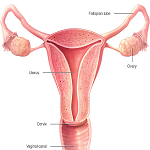Diet in Pregnancy
Written by Dr.M.D.Mazumdar, MD
You are what you eat. More importantly, when you are pregnant, your baby is also what you eat.
You need to eat a well-balanced and varied diet to get all the essential nutrients you need during pregnancy.
It is not necessary to increase the amount of food you eat. The quality of your diet has to be improved, not the quantity.
The large variety of food available in the market makes it difficult to decide what will best provide you and your baby with a balanced diet.
But, in order to get adequate nutrients, the diet must contain food from the various food groups - carbohydrates, proteins and fats. Fruits, vegetables, nuts and seeds are other important additions to the diet.
The different food groups and and the number of 'servings' of each group that you need to eat daily is discussed here.
The Food Pyramid
The food pyramid is a food quide showing the recommended daily intake from each good group. As the image of the food pyramid shows, your pregnancy diet should include food from all the 6 major food groups.

The Food Pyramid
The food pyramid helps to make healthy choices easier since it shows all the food groups in a single glance.
Food providing Carbohydrates
Carbohydrates give us energy necessary for our life. The major sources of carbohydrates are foods like breads, rice, noodles and cereals. They also provide nutrients like vitamin B, iron, zinc and certain trace minerals.
Whole grain cereals and pasta, brown bread and multi grain biscuits contain a large amount of fibre. Oats and muesli are also very good sources of complex carbohydrates and fibre.
Requirements - Eat at least 6 servings of carbohydrates a day. A single serving is:
Food providing Proteins
Proteins are the building blocks of the body cells. The amino-acids that form proteins are needed to make all the different body tissues like muscles, blood, nerves, bones and all the organs of our body. Food with large amounts of proteins also contain iron and folic Acid which are needed by both your and your baby.
Normal requirement in a non-pregnant woman is 1 gram per Kg body weight per day. In pregnancy, 10 grams of extra protein should be added daily over the normal non-pregnant requirement of 1gm per Kg of body weight.
Requirements: Eat at least 3 servings of protein each day. Each serving is equivalent to:
Milk and milk products
Milk and milk products are a rich source of calcium, protein, vitamin D, vitamin B12 and other fat soluble vitamins and minerals. Your baby needs calcium to build strong bones and teeth as well as to develop muscle, heart and nerve tissue.
If the calcium supply in your diet is inadequate, the calcium from your bones will leak out to supply your baby's needs. This can create a risk that you will develop osteoporosis in later life. Cramps in the calves of the legs and pains in the long bones are also signs that the calcium level in your body is low.
Milk products are also rich sources of proteins and Vitamins of the B group, especially for vegetarians.
The normal daily requirement of calcium is 1000mg in pregnancy and 1500 mg in breastfeeding mothers.
Requirements: You need at least 4 servings of milk and milk products in a day. A single serving is equivalent to:
Fruits
Fruits are among the tastiest foods available to man. They add taste, texture and flavour to your diet. Even when you lose your appetite in the early stages of your pregnancy, you will often find that fruits are the only food that you can eat. Fruits are also packed full of essential vitamins and minerals necessary for the baby's growth. They also provide dietary fibre and anti-oxidants. The skin of the fruit should be retained wherever possible as it provides valuable nutrients.
Requirements:Eat at least 5 servings of fruits daily. A single serving of fruit is:
Vegetables
Vegetables, like fruits, are rich in vitamins, minerals and necessary trace elements. They add crunch, colour and flavour to your diet and provide you with fluids and fibre.
Requirements:Eat at least 4 servings of vegetables in a day. One serving is equivalent to:
Fats and Oils
Although some amount of fats and oils are necessary in the diet, too much can make you overweight. You should try to minimize the amount of fat and oils in your diet.
Butter, margarine and salad dressings like mayonnaise, pastry, fatty meats, cakes, biscuits and most take-away foods contain bad fats and need to be severely restricted.
Olive oil, rice bran oil are the good oils that not only provide the necessary fat but also supply some amount of fat soluble vitamins and anti-oxidants.
The average daily requirement of fat in pregnancy is 35 to 40 grams.A total of 5 teaspoonfuls of oil is enough to provide this amount in a day.
Nuts and seeds like almonds and peanuts can supply you with the right fats. They are also good sources of proteins and are also tasty to eat. You can take 2 servings of nuts and seeds in a day, 1 serving being 2 tablespoonfuls.
Read More:
Also Read-
- Female Reproductive Anatomy.
- How and Why Pregnancy Occurs.
- Vaginal Discharge in Pregnancy .
- Breastfeeding the Newborn Baby.
Do you have a gynecological or obstetrical problem? Would you like to discuss it in private? Consult our online gynecologist Dr.M.D.Mazumdar, MD (O&G), at any time you want and get your reply within 24 hours.We charge a nominal fee of USD 20 ($20) per question through Paypal.com.
The procedure of asking a question is quite simple. Clicking on the link below takes you to the Paypal website where the payment is made. After the payment goes through, you will be directed back to this website where you can ask your question. And rest assured, you will get your answer within 24 hours. And usually, even sooner.


